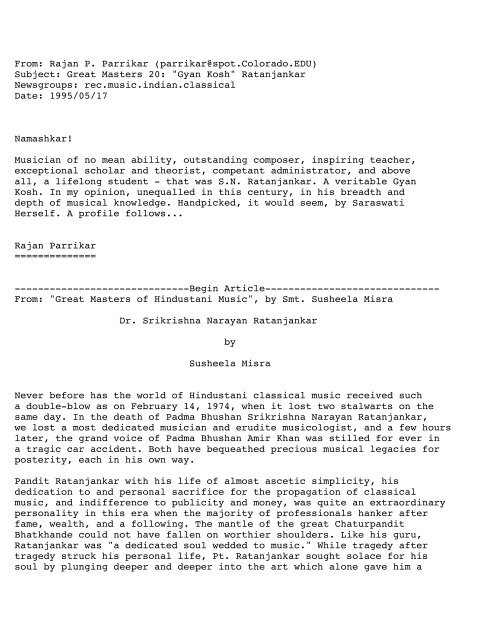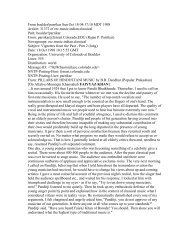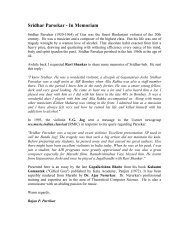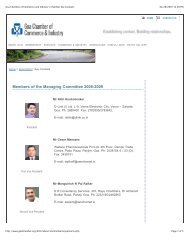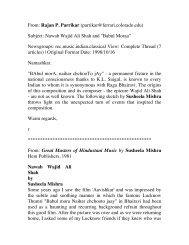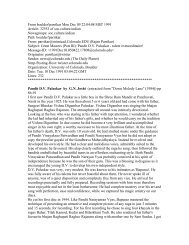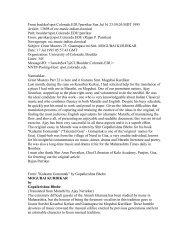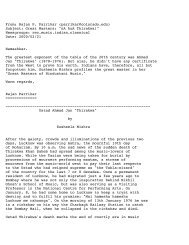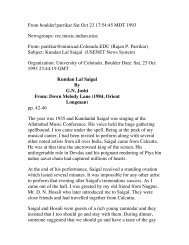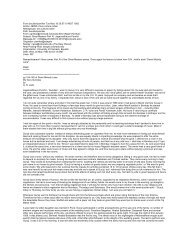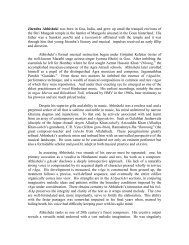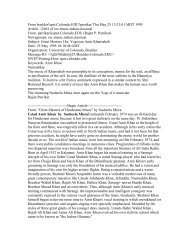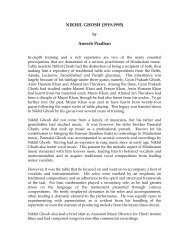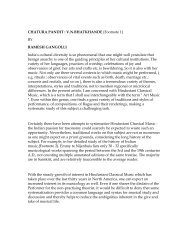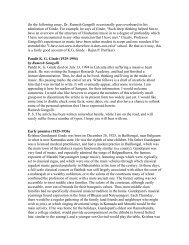Subject: Great Masters 20: "Gyan Kosh" Ratanjankar Newsgroups: r
Subject: Great Masters 20: "Gyan Kosh" Ratanjankar Newsgroups: r
Subject: Great Masters 20: "Gyan Kosh" Ratanjankar Newsgroups: r
You also want an ePaper? Increase the reach of your titles
YUMPU automatically turns print PDFs into web optimized ePapers that Google loves.
From: Rajan P. Parrikar (parrikar@spot.Colorado.EDU)<strong>Subject</strong>: <strong>Great</strong> <strong>Masters</strong> <strong>20</strong>: "<strong>Gyan</strong> Kosh" <strong>Ratanjankar</strong><strong>Newsgroups</strong>: rec.music.indian.classicalDate: 1995/05/17Namashkar!Musician of no mean ability, outstanding composer, inspiring teacher,exceptional scholar and theorist, competant administrator, and aboveall, a lifelong student - that was S.N. <strong>Ratanjankar</strong>. A veritable <strong>Gyan</strong>Kosh. In my opinion, unequalled in this century, in his breadth anddepth of musical knowledge. Handpicked, it would seem, by SaraswatiHerself. A profile follows...Rajan Parrikar==============------------------------------Begin Article------------------------------From: "<strong>Great</strong> <strong>Masters</strong> of Hindustani Music", by Smt. Susheela MisraDr. Srikrishna Narayan <strong>Ratanjankar</strong>bySusheela MisraNever before has the world of Hindustani classical music received sucha double-blow as on February 14, 1974, when it lost two stalwarts on thesame day. In the death of Padma Bhushan Srikrishna Narayan <strong>Ratanjankar</strong>,we lost a most dedicated musician and erudite musicologist, and a few hourslater, the grand voice of Padma Bhushan Amir Khan was stilled for ever ina tragic car accident. Both have bequeathed precious musical legacies forposterity, each in his own way.Pandit <strong>Ratanjankar</strong> with his life of almost ascetic simplicity, hisdedication to and personal sacrifice for the propagation of classicalmusic, and indifference to publicity and money, was quite an extraordinarypersonality in this era when the majority of professionals hanker afterfame, wealth, and a following. The mantle of the great ChaturpanditBhatkhande could not have fallen on worthier shoulders. Like his guru,<strong>Ratanjankar</strong> was "a dedicated soul wedded to music." While tragedy aftertragedy struck his personal life, Pt. <strong>Ratanjankar</strong> sought solace for hissoul by plunging deeper and deeper into the art which alone gave him a
purpose in life and courage to pursue the ideals set before him by hisrevered guru.Decades ago, when Pt. <strong>Ratanjankar</strong> was known with affection and respect as"Anna Saheb" among his colleagues, friends and followers, and his voicewas in excellent form, he could have chosen the more paying and excitinglife of a practical musician. But, such was his reverence and loyalty tothe memory of his Guru, that he chose to follow the latter's footsteps,to continue the work of training generations of musicians and musicteachers, and to work in every possible way for the propagation ofclassical music. So dedicated was he to his ideals, that he stuck onsteadfastly to the Principalship of the Bhatkhande Music College, Lucknow,through three long decades when emoluments were meagre, and sometimes,not forthcoming at all! Leaving his family in Bombay, Srikrishna <strong>Ratanjankar</strong>spent the best years of his life cooped up in a small room next to hisequally small office-cum-class room in the college. It would not be anexaggeration to say that but for the enormous personal sacrifices that hemade, this music college would not have survived the years of poverty andemerged as such a reputed institution today. While personal tragediesassailed his life repeatedly, this small, frail, man continued to livelike a true Karma Yogi, imparting music to students and scholars who flockedto him from all parts of India, and Ceylon, writing scholarly articles onmusic for various journals, seminars and radio-talks, and enriching ourmusic with a prolific number of masterly compositions such as Khayals,Lakshanageets, Taranas and Bhajans (in Hindi and Sanskrit). An eruditescholar in music, he remained an eager student and research-scholar tillthe end.Born on the first dawn of this century in a middle-class Maharashtrianfamily of Bombay, Srikrishna's father (an officer in the C.I.D.) had adeep and discriminating interest in music. Therefore, he was able to havethe good fortune of receiving excellent training in the art under the mostefficient masters available. At the age of 7, young Srikrishna was putunder the training of Pt. Krishnam Bhat of Karwar (a pupil of Kale Khan ofPatiala Gharana) whose method of teaching was so thorough that in 2 yearsof (nothing but) scale exercises, the boy's "swar-jnan" was perfected. Hisnext teacher was Pt. Anant Manohar Joshi (a pupil of Balakrishna Buwa). Itwas about this time that Srikrishna's family came into contact withPt. Bhatkhande Ji. The latter was so deeply impressed by the boy's talentand zeal, that the Chaturpandit predicted that with proper training, hewould not only become a great musician, but also a pioneer in therejuvenation and popularization of Hindustani classical music.From 1912, <strong>Ratanjankar</strong>'s family had to endure many misfortunes. YoungSrikrishna lost his mother, and his father had to retire from service ona premature pension owing to recurring heart-attacks. Unable to live ina costly place like Bombay, the family shifted to Ahmadnagar whereSrikrishna, though only 13, began to give "mehfils" (music sittings) and
ecame very popular.In 19l6 Srikrishna took part in the first All India Music conference inBaroda. In 1917. he was given a scholarship by Baroda State for studyingmusic. The family moved to Baroda where the teen-aged musician taught theMaharani for some time. With Pandit Bhatkhande's approval he became adisciple of Aftab-e-Mousiqui Ustad Faiyaz Khan and remained with him forfive years. The mutual affection and respect between these two was great,and the Ustad always mentioned Srikrishna's name as one of the most eminentof his "musical heirs".In 1923 <strong>Ratanjankar</strong>'s family went back to Bombay. In spite of thevicissitudes of the family, and his all-engrossing musical training, hefound time to pursue his academic studies as well, and in the year 1925,<strong>Ratanjankar</strong> graduated from the Wilson College. The contact with PanditBhatkahandeji was always maintained, and then <strong>Ratanjankar</strong> began to takeclasses and give performances in the Sharada Sangeet Mandal sponsored byBhatkhande. Later on, when Pt. Bhatkhande started the Music College inLucknow, <strong>Ratanjankar</strong> was brought here, first as professor, and soon after,became Principal. The latter used to accompany the Chaturpandit during hisvisits to the various eminent musicians of the day to collect ancientcompositions from various Gharanas. Thus he was able to learn an enormousnumber of old and traditional compositions (Dhrupads, Dhamar, Khayals,Lakashanageet and Thumri). Like Bhatkhandeji, his disciple also strove invarious ways through lectures, classes, demonstrations, writings etc., torevive interest in classical music among the public.A senior music teacher of today recalls the first time he met and heardSri <strong>Ratanjankar</strong>. It was in the All India Music Conference organised inLucknow in 1924. In that conference where music maestros from all importantcentres like Rampur Jaipur, Gwalior, Alwar, Dholpur, Indore, Baroda andMaihar had assembled, Shrikrishna somehow stood out like a young Abhimanyuamong the revered Dronas, Bhishmas, etc. Besides being a graduate and apolished musician, he was already a profound scholar in music. His voicewas in excellent form and his erudition in "Sangeet Shastra" was astounding.He could render rare and difficult ragas like Deepak, Patmanjari,Natnarayan, Bhankar, etc., with as much ease as the Prachalit (currentand popular) ones like Yaman, Bilawal, Todi, Bhairavi etc.He knew by heart even the rare compositions published in the fifth andsixth parts of Bhatkhande's Kramik Series. We could not help wondering howand when he had managed to learn such a large number of ragas andcompositions, to take his B. A. Degree, and to make such a deep study ofclassics like Sungeeta-Ratnakar, Natya-Shashtra, Lakshya-Sangeet, RagaTala vibodh and so on !Those who have had the good fortune to listen to "Anna Saheb's"(<strong>Ratanjankar</strong>'s) music when he was in his best form can never forget the
vastness of his raga - and - songs - repertoire, the richness of hiscreative imagination, the purity and precision of his note-combinations,and the overall beauty of his well-integrated, systematic style. Being ofa shy and quiet temperament, and a genuine votary of music, Annasaheb nevermade any concessions to placate plebian tastes. He retired into his ownquiet shell, and loosened the springs of his great and unspoilt art, onlyin front of the knowing and discerning few. His style, though basically ofthe Jaipur Gharana, bore the unmistakable impression of Ustad Faiyaz Khan'sAgra or Rangeela style, while delightfully combining some of the bestcharacterstics of the Gwalior-gharana. The resulting synthesis was aremarkable individual style of his own. It was a rare combination ofsweetness and dignity, aesthetic purity and creativeness and of swarasuddhi with Uchchaar suddhi (purity of notes and intonation). I have hadthe good fortune to listen to innumerable soirees of Annasaheb when hismusic was at the peak of its glory. Some of his memorable performances wereat the various festival functions organised in the college such as Basant,Hori, Janmashtami and so on. But it was at the annual Sangeet Dharaprogrammes, dedicated to Pt. Bhatkhande's memory, that he really sang likeone inspired, and poured out his soul in song, in honour of his gurus"Punya tithi." Past and present students, musicians from far and near,used to flock to participate in this unbroken-musical stream whichcommenced at dawn on l9th of September each year, and lasted for 12 hours.The ragas Paraj, Bhairavi, Lalit Poncham, Desh, Darbari ,Sohini, andMalhar that I heard him sing in the Nineteen forties still echo in my ears.Throughout the day and late into the night, Annasaheb lived in a musicalworld of his own, engrossed in ancient music classics, and composing newrare-combinations like Marga-Bihag, Kedar Bahar, Sawani Kedara, RajaniKalyan, Salag Varali, Sankara Karan etc. He also experimented on new typesof compositions like Varnams from Carnatic music with Hindi Sahitya andTaranas with Sanskrit verses instead of Persian ones. Well versed inEnglish, Hindi, Sanskrit, and Marathi, all this came to him with ease. Itwas a joke (though a fact) among his students, that his "companions" duringrailway-journeys were never light magazines or novels, but heavy classicslike the Samaveda, Bharata Natya Sastra, and Sangeeta Ratnakara.With the passing of years, the strenuous years of music teaching, theimpact of tragic personal losses, and deteriorating health-all these factorsruined his voice. <strong>Ratanjankar</strong> performed less and less frequently. Heconcentrated on other aspects of music-creativity. As an examiner in variousuniversities, and as a member of the Syllabus-Committee, he wrote andpublished his Sangeet Shiksha in 3 parts, the Abhinava Sangeet Shiksha, theTana Samgraha, etc. His Abhinava - Rag Manjari alone contains nearly <strong>20</strong>0of his original and beautiful compositions. He never tried to publicise thefact that his compositions are being broadcast from the various stations ofAll India Radio almost every day. Generations of musicians will revere hismemory as one of the most eminent and prolific Vagyeyakars of modern times.Only a musician-cum scholar could create such beautiful classical songs in
which Swaras and Sahitya, blend so harmoniously. Annasaheb's musical credowas that the effect of music ought to be, and is pure aesthetic joy" andthat the musician should be able to draw out from every raga whatever rasaor emotion he wishes to". Perhaps it was to illustrate this point that hewrote his successful musical operas-Govardhanodhar, Jhansi Ki Rani andShivamangalam. The first of these was put out as a national programme fromall stations of AIR. In all of them, he made use of a plethora of ragasto produce various rasas.When the Indira Kala Sangeet University was inaugurated in Khairagarh(Madhya Pradesh), Principal <strong>Ratanjankar</strong> was persuaded to accept theVice-Chancellorship. Leaving his humble college in Lucknow was a mostpainful wrench for him. Again, like a true karma-yogi, he felt it was hisduty to take up this new challenging job, see this infant Universitythrough its birth-pangs, and put it on firm foundations. In fact, a lessdedicated person could not have borne this heavy responsibility. Night andday, he strove selflessly for the University. Only his closest-associatesknow how he secretly used to donate a large slice of his own salary backto the University whenever funds became inadequate. He did not lay downthe heavy reins of this office until he had steered this institution outof troubled waters and set it sailing along calm seas.At a time when the majority of north Indian musicians looked askance atKarnatak music, Shri <strong>Ratanjankar</strong> was one of the very few who studied deeplythe theory and ragas of the Karnatak system, appreciated its greattraditions, and adapted much from it to enrich the Hindustani system.Averse to party politics, and narrow provincialism, he remained dignifiedand above petty jealousies. Sangeet Kalanidhi Justice Venkatrama Iyerdescribed <strong>Ratanjankar</strong> as "the symbol of the unity of lndian music". As amember of the expert committee of the Music Akademy, Madras, he contributedrichly to "promote close mutual understanding between the two systems".As chairman of the Music Auditions Board, Pt. <strong>Ratanjankar</strong> was closelyassociated with AIR for a number of years. He participated in many musicseminars with his scholarly papers. Among his more well-known disciplesmay be mentioned the late Chandrasekhar Pant, the late Chidanand Nagarkar,Chinmoy Lahiri, Dinkar Kaikini, P.N. Chinchore, Dr. Sumati Mutatkar,S.C.R. Bhat, K.G. Ginde and others. While all of them have been regularbroadcasters, two of them served on the staff of the AIR for many years.But now most of them are teaching music.Shri <strong>Ratanjankar</strong> adorned many positions of honour in the world of musicand was honoured with the title of "Padma Bhushan" by President RajendraPrasad in recognition of his outstanding services to music.Musicians and musicologists from all over the country pay their homageto the memory of this rare "missionary" in music who lived a life of uttersimplicity and dedication, and who enriched Hindustani music in many ways.
In one of his many lovely Bhajans he used to sing: "It is a precious giftto be born as a human being on this earth. Do some good work while you arehere. Keep your mind and body and your entire life pure and clean. Helpthose in need. Make your life useful and purposeful". In fact, thisdescribes Pt. <strong>Ratanjankar</strong>'s own approach to life.---------------------------------End Article-----------------------------


